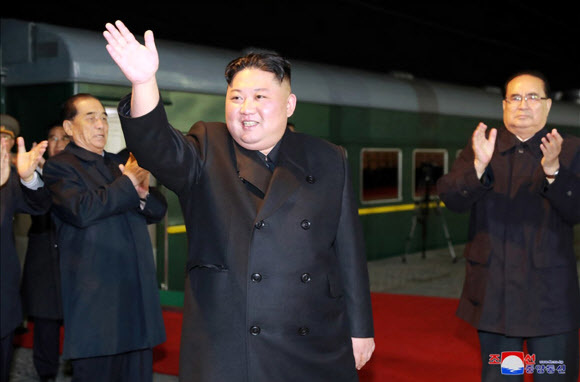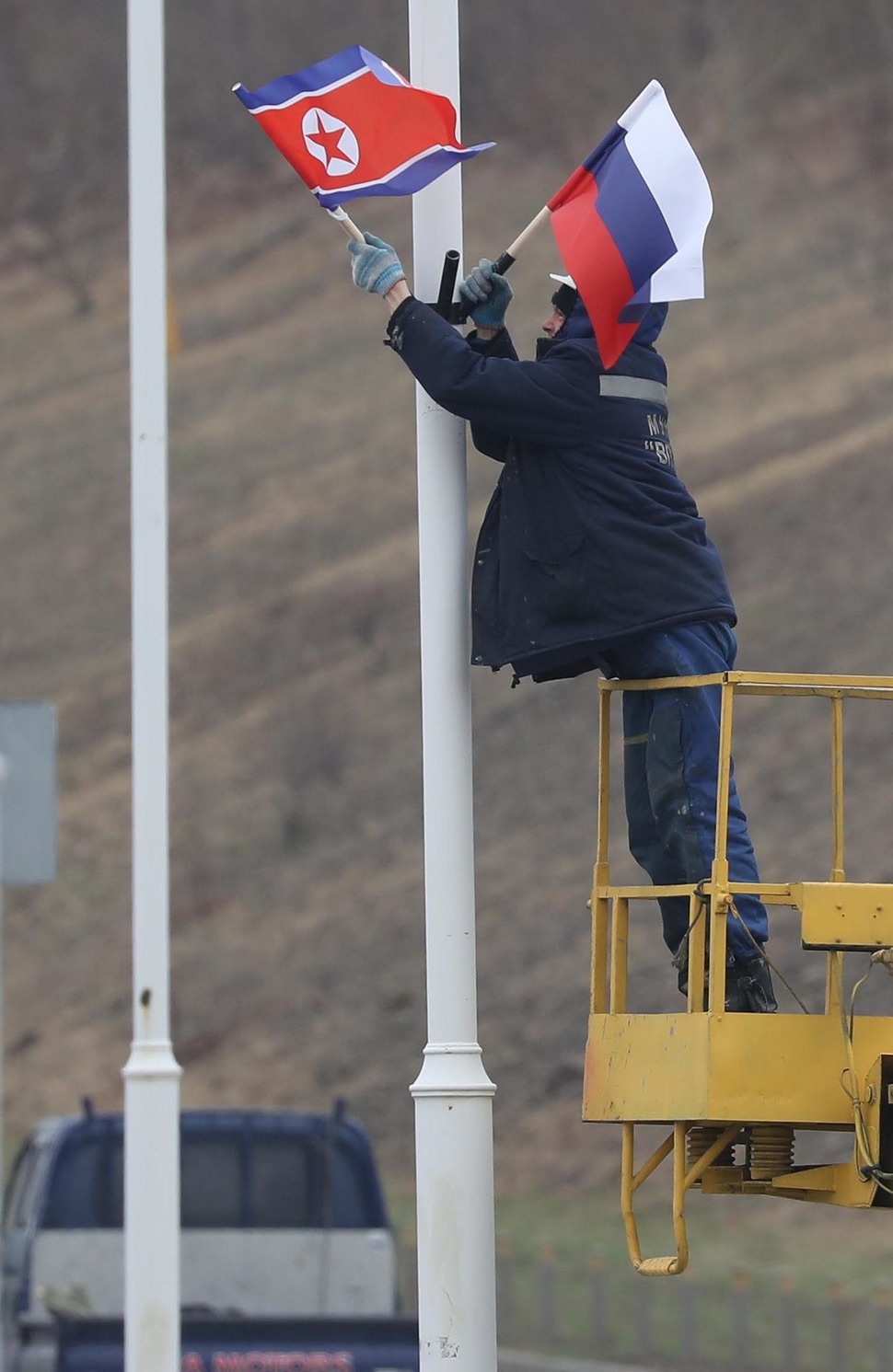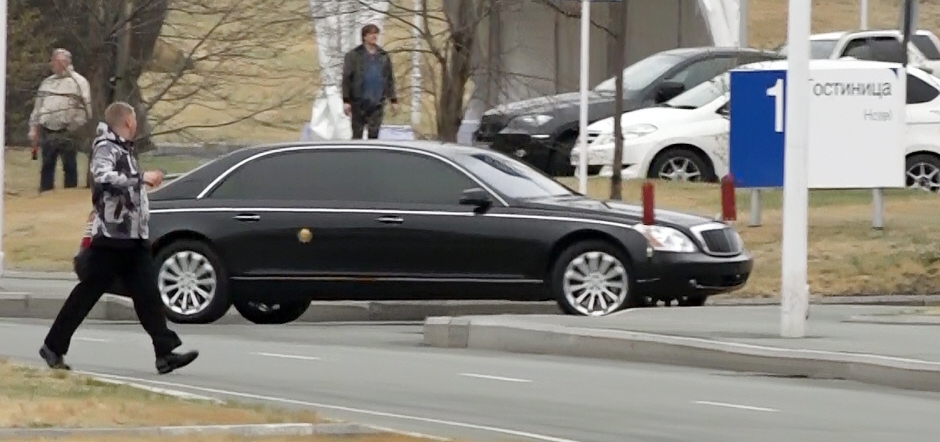Posted on : Apr.24,2019 16:46 KST
Modified on : Apr.24,2019 20:22 KST
 |
|
North Korean leader Kim Jong-un waves at a undisclosed station in North Korea before boarding his personal train to Vladivostok in the early hours of Apr. 24.
|
Vladivostok summit increases chances of Xi Jinping visiting Pyongyang
The South Korean government is closely watching the outcome of North Korean leader Kim Jong-un’s visit to Russia on Apr. 24–26 and first summit with Russian President Vladimir Putin, which marks the resumption of his diplomatic activities after their temporary halt in the wake of the North Korea-US summit in Hanoi.
Kim In-chol, a spokesperson for the North Korean Foreign Ministry, said on Apr. 23 that Russia “shares common goals with us, including the achievement of complete denuclearization on the Korean Peninsula and the establishment of permanent peace.”
“We anticipate that this summit will contribute to positive developments,” he added.
On Apr. 24, Russian state news agency RIA-Novosti reported that Kremlin aide Yuri Ushakov said that Kim and Putin will hold one-on-one negotiations and an extended summit on Apr. 25. Ushakov added that that while the two leaders do not plan on signing any agreements or statements, they will focus their discussions on political and diplomatic solutions regarding the denuclearization of the Korean Peninsula.
 |
|
A North Korean flag flies next to a Russian flag at Far Eastern Federal University, where North Korean leader Kim Jong-un and Russian President Vladimir Putin are expected to meet on Apr. 25. (Yonhap News)
|
Commenting on Kim’s Russia visit, a senior Blue House official described it on Apr. 22 as a “process within the denuclearization process.”
“South Korea’s position is that if it helps in producing a good outcome, it’s a good thing,” the official said.
While Kim’s visit to Russia is a scheduled diplomatic event with preparations announced as early as the second half of 2018, it is also taking place amid a new climate following the Hanoi summit’s failure to produce an agreement. Kim appears to be reaching out to traditionally friendly Russia to secure “auxiliary forces” as the breakdown in negotiations with the US leaves it facing diplomatic, security-related, and economic difficulties. In addition to enlisting Moscow to break away from Pyongyang’s heavy diplomatic reliance on Beijing, another potential effect of the “tightrope diplomacy” may be to spur China into taking on a more proactive role.
“China’s behavior has changed since Kim Jong-un’s Russia visit has been finalized,” a foreign affairs source said. “There’s definitely more of a possibility now that Chinese President Xi Jinping will visit the North sometime in May or June.”
Lee Kwan-se, director of the Kyungnam University Institute for Far Eastern Studies, predicted, “With North Korea having difficulties establishing common ground with the US under the current circumstances, it’s going to use a stronger relationship with Russia as a starting point to get its relations with China on a firmer footing and establish a North Korea-Russia-China ‘front’ before resuming dialogue with South Korea and the US.”
From Russia’s side, anticipated effects may include escaping its relatively marginalized role beside South Korea, US, and China in diplomatic efforts with the North and gaining a stronger voice on Korean Peninsula issues, as well as establishing a more favorable climate for Putin’s “new East policy” and development of Russia’s far eastern region.
In his summit with Putin, Kim is expected to stress the need for support in relieving sanctions and discuss different areas of economic cooperation, including increased trade, collaboration in transportation and shipping, and the issue of North Korean workers staying in Russia. In the past, Russia has stated the position that UN Security Council sanctions on North Korea should be reduced as a corresponding measure for preliminary denuclearization steps by the North, including its nuclear test site demolition and halt to missile test-launches. Russia’s list of demands has also included exemptions on UNSC sanctions for the Rajin-Hasan development project it is pursuing with the North.
NK-Russia summit more symbolic than practical
But analysts suggest the North Korea-Russia summit’s effects for Kim would be more symbolic than practical.
“At a time when the negotiation track with the US is not operating, Kim Jong-un’s primary aim appears to be enlisting a powerful ally in Russia and showing internationally that it is still alive and well,” said a foreign affairs official.
“Russia is going to be hard-pressed to provide North Korea will much practical assistance in terms of sanction relief or economic areas,” the official predicted.
 |
|
An armored limousine for North Korean leader Kim Jong-un heads to Far Eastern Federal University in Vladivostok, Russia, on Apr. 2. The limousine arrived in advance in preparation for the North Korea-Russia summit. (Yonhap News)
|
The same official added that Seoul was “looking forward to Russia playing a positive role in helping North Korea return to dialogue with the US.”
“Under the circumstances, a decisive breakthrough would be a lot to expect.”
By Park Min-hee, staff reporter
Please direct comments or questions to [english@hani.co.kr]











